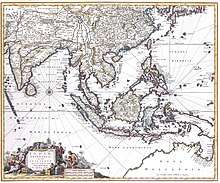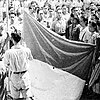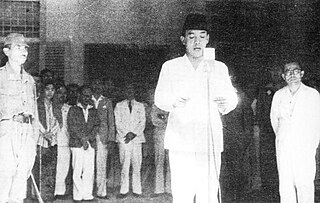
The Indonesian National Revolution, also known as the Indonesian War of Independence, was an armed conflict and diplomatic struggle between the Republic of Indonesia and the Dutch Empire and an internal social revolution during postwar and postcolonial Indonesia. It took place between Indonesia's declaration of independence in 1945 and the Netherlands' transfer of sovereignty over the Dutch East Indies to the Republic of the United States of Indonesia at the end of 1949.

Sukarno was an Indonesian statesman, orator, revolutionary, and nationalist who was the first president of Indonesia, serving from 1945 to 1967.
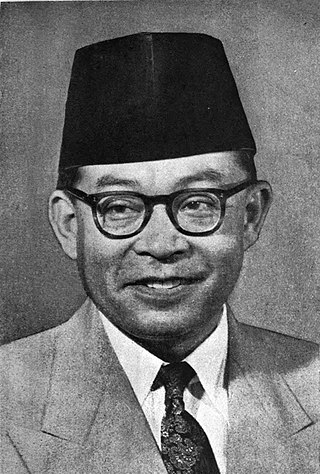
Mohammad Hatta was an Indonesian statesman, nationalist, and independence activist who served as the country's first vice president as well as the third prime minister. Known as "The Proclamator", he and a number of Indonesians, including the first president of Indonesia, Sukarno, fought for the independence of Indonesia from the Netherlands. Hatta was an important figure during the Indonesian national awakening and during the national revolution, as a youth he was politically active both in the Netherlands and the Indies, which led him to be imprisoned in the Boven Digoel concentration camp for his activism, he also played a crucial part in the proclamation of Indonesian independence, being second the person to sign the declaration besides Sukarno, thus naming him as one of the founders of Indonesia.

Bukittinggi is the third largest city in West Sumatra, Indonesia, with a population of 111,312 in 2010 and 121,028 in 2020. An official estimate as of mid 2023 lists a population of 124,047, consisting of 61,949 males and 62,098 females. The city covers an area of 25.24 km2. It is located in the Minangkabau Highlands, 90 km by road from the West Sumatran capital city of Padang. The city is completely surrounded by the Agam Regency, making it an enclave within the regency, and it is located at 0°18′20″S100°22′9″E, near the volcanoes Mount Singgalang (inactive) and Mount Marapi. At 930 m above sea level, the city has a cool climate with temperatures between 16.1° to 24.9 °C.
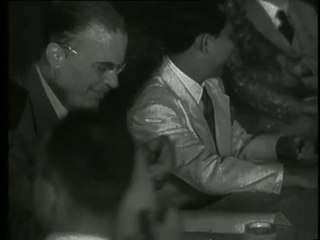
The Linggardjati Agreement was a political accord concluded on 15 November 1946 by the Dutch administration and the unilaterally declared Republic of Indonesia in the village of Linggajati, Kuningan Regency, near Cirebon in which the Dutch recognised the republic as exercising de facto authority in Java, Madura, and Sumatra.

Operation Kraai was a Dutch military offensive against the de facto Republic of Indonesia in December 1948, following the failure of negotiations. With the advantage of surprise, the Dutch managed to capture the Indonesian Republic's temporary capital, Yogyakarta, and seized Indonesian leaders such as de facto Republican President Sukarno. This apparent military success was, however, followed by guerrilla warfare, while the violation of the Renville Agreement ceasefire diplomatically isolated the Dutch. This led to the Dutch–Indonesian Round Table Conference and recognition of the United States of Indonesia.

This is the timeline of Indonesian National Revolution.

Sjafruddin Prawiranegara was an Indonesian statesman and economist. He served in various roles during his career, including as head of government in the Emergency Government of the Republic of Indonesia, as Minister of Finance in several cabinets, and as the first Governor of Bank Indonesia. Sjafruddin later became the prime minister of the Revolutionary Government of the Republic of Indonesia, a shadow government set up in opposition to the country's central government.

The First Hatta Cabinet was Indonesia's seventh cabinet. It was formed by Vice President Mohammad Hatta, who was instructed to do so by President Sukarno on 23 January 1948, the same day the previous cabinet was declared dissolved. Following the second Dutch military aggression, when the republican capital of Yogyakarta was seized and most of the cabinet arrested, much of the cabinet was captured and sent into exile, although it was not formally disbanded. After the political leadership returned effective 13 July 1949 the cabinet continued its mandate until it was reshuffled on 4 August.

Sjafruddin Prawiranegara's Emergency Cabinet was the government of the Emergency Government of the Republic of Indonesia (PDRI), effectively Indonesia's government in exile, established in Bukittinggi, West Sumatra following the second Dutch military aggression when the republican capital of Yogyakarta was seized and most of the cabinet allowed itself to be captured in the hope of attracting sympathy from the outside world.

Teuku Mohammad Hasan was an Indonesian politician and national hero from Aceh, who served as the first and only governor of Sumatra from 1945 until 1948. He also served as a cabinet minister in Sjafruddin Prawiranegara's emergency cabinet and was a member of both the Senate of the United States of Indonesia (USI) and the Provisional People's Representative Council (DPRS) of the Republic of Indonesia.

The State of Pasundan was a federal state (negara bagian) formed in the western part of the Indonesian island of Java by the Netherlands in 1948 following the Linggadjati Agreement. It was similar to the geographical area now encompassed by the current provinces of West Java, Banten and Jakarta.

Major general TNI (Tit.) Dr. Adnan Kapau Gani or commonly abbreviated as A.K. Gani was an Indonesian doctor, politician, actor and military figure. He served as Deputy Prime Minister in the Cabinet of Amir Sjarifuddin I and the Cabinet of Amir Sjarifuddin II.
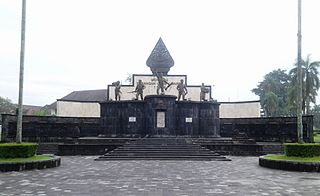
The General Offensive of 1 March 1949 was a military offensive during the Indonesian National Revolution where the city of Yogyakarta was held by Indonesian troops for six hours. This played an important role in causing international pressure to be exerted on the Netherlands.

Mr. Sutan Mohammad Amin Nasution, also known by his birth name Krueng Raba Nasution, was an Indonesian lawyer and politician with an Acehnese–Mandailing background.
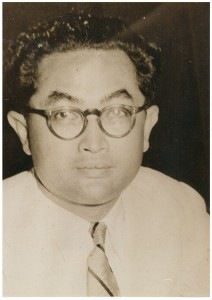
Lukman Hakim was an Indonesian economist and diplomat who served as Minister of Finance between 1948 and 1950, serving under both the Emergency Government of the Republic of Indonesia and the Republic of Indonesia during the United States of Indonesia period. He was also the Governor of Bank Indonesia between 1958–1959, and the Ambassador to West Germany between 1961 and his death in 1966.
Bidar Alam is a nagari (village) in Sangir Jujuan, South Solok Regency, in the Indonesian province of West Sumatra, with a population of over 3,000 people. It is known for being the seat of the Emergency Government of the Republic of Indonesia for a brief period in 1949.

Mananti Sitompul, was a Christian Indonesian politician from North Sumatra. A member of the Indonesian Christian Party (Parkindo), he served in several national cabinets during the Indonesian National Revolution. Born in Pahae, North Tapanuli, he studied at the Technische Hoogeschool te Bandoeng (THB), and graduated as a civil engineer in 1939. Subsequently, he worked at the Waterloopkundig Laboratory and later at the Waterstaatsdienst. During the Japanese occupation, he became the head of the Provinciale Waterstaat of West Java, before he moved to Sukabumi and later Jakarta, to work in the Public works office.

Colonel Dahlan Djambek was a military officer, independence fighter, and minister in the Cabinet of the Revolutionary Government of the Republic of Indonesia (PRRI). During the Japanese occupation of West Sumatra, he was appointed Chairman of the Sumatra Chokai.
